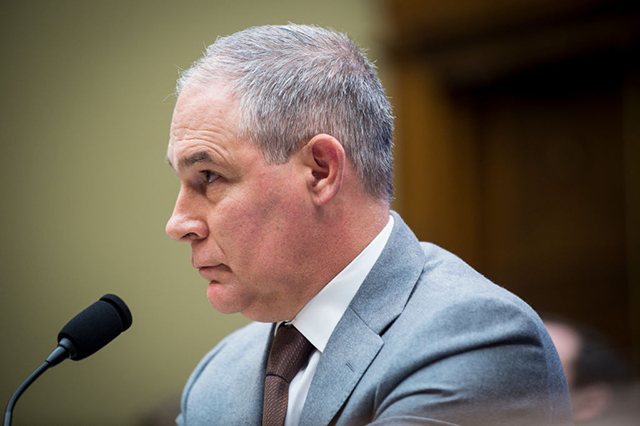
 Environmental Protection Agency Administrator Scott Pruitt testifies before the House Energy and Commerce Committee about the mission of the US Environmental Protection Agency on December 7, 2017, in Washington, DC. (Photo: Pete Marovich / Getty Images)
Environmental Protection Agency Administrator Scott Pruitt testifies before the House Energy and Commerce Committee about the mission of the US Environmental Protection Agency on December 7, 2017, in Washington, DC. (Photo: Pete Marovich / Getty Images)
New Orleans — On February 12, as much of southern Louisiana was focused on Mardi Gras parades, the government announced a multimillion-dollar settlement with Shell Oil over a long list of air pollution violations at a petrochemical refinery in Norco, Louisiana. In a statement, Environmental Protection Agency (EPA) Administrator Scott Pruitt said the settlement “demonstrates EPA’s dedication” to pursuing pollution violations and protecting public health.
However, it was President Obama’s EPA, not Pruitt and the Trump administration, that issued the long list of air pollution violations against the Norco refinery. Environmentalists say the $350,000 in fines finally levied against Shell amount to a slap on the wrist, part of a pattern of lax enforcement under Pruitt’s watch. Federal regulators say the Norco refinery has illegally released toxic pollutants such as benzene into the air since at least 2009, and local advocates have been documenting such pollution for nearly two decades. They say the government should have been enforcing the law 20 years ago.
In 1999, when environmental justice organizer Anne Rolfes first arrived in Diamond, Norco’s historically Black neighborhood located along the refinery’s fence line, residents were already years into a fight with Shell Oil.
“When I got there in 1999 there had [already] been 30 years of pollution, people had been experiencing it for a long time,” Rolfes told Truthout in an interview.
The refinery mostly hired workers from Norco’s white neighborhoods, so most Diamond residents did not benefit from an uptick in jobs. Meanwhile, Diamond residents had long suspected that foul-smelling fumes from the plant were making them sick. The memories of two deadly explosions — one in 1973 that engulfed a teenager and his neighbor in flames and another in 1988 that killed seven refinery workers and was felt for miles — were still fresh in their minds. The residents were demanding Shell buy their homes so they could move somewhere else. Some said they feared for their lives.
The consent decree looks good on paper, but it’s meaningless without regulatory enforcement.
“For us who lived there, it was like living next to a ticking time bomb,” Margie Richard, a former Norco resident who organized with a local environmental justice group to take on Shell Oil, told Truthout in an interview. “You could never breathe the air.”
To prove their point, residents armed themselves with five-gallon buckets containing air-sampling units and began testing the air in their neighborhood. They consistently detected benzene, a known carcinogen that causes an array of health problems, as well as other toxic emissions. Each positive test bolstered their argument against the company, which eventually agreed after several years of negotiations to buy out a number of homes so residents could relocate. Richard moved about 20 minutes away to nearby Destrehan, where she could stay close to family.
Such “bucket brigades” have since become a hallmark of the grassroots environmental justice movement. Rolfes is the founding director of the Louisiana Bucket Brigade, and her organization still tracks pollution from the Norco refinery and several other facilities in Louisiana’s industrial corridor. The Norco refinery reported 23 accidents and released more than 100,000 pounds of benzene, sulfur dioxide and other pollutants into the air in 2013 alone, according to the group’s accident database.
Penalties for violating environmental laws are down 60 percent compared to the first year of the Obama administration.
Now, the government is finally catching up with local activists after settling with Shell Oil over a long list of air pollution violations at the refinery. According to a consent decree negotiated by the Justice Department, the company will pay $350,000 in fines and spend $10 million on new pollution control equipment to reduce dangerous emissions from the refinery’s four industrial flares, which can often be seen burning bright in the night sky.
The Environmental Protection Agency estimates the settlement will help Shell reduce air pollution emissions by 150 tons, but Rolfes will believe it when she sees it. She said the consent decree looks good on paper, but it’s meaningless without regulatory enforcement, which is sorely lacking in Louisiana. She added that $350,000 in fines is a paltry sum considering the environmental laws the refinery has broken and the lives that have been impacted.
“A fine tells you how serious they are, and they didn’t get fined for a quarter century of pollution,” Rolfes said.
In fact, the amount that polluters are paying in fines and penalties has plummeted over the past year under Pruitt and the Trump administration. Penalties for violating environmental laws are down 60 percent compared to the first year of the Obama administration and 49 percent compared to the average amount levied by the EPA during the first year of Bush, Obama and Clinton administrations, according to a recent report by the Environmental Integrity Project.
The amount that Trump’s EPA has required companies to spend to clean up their pollution has also dropped. The EPA demanded polluters spend $3.3 billion on cleanup during the first year of the Obama administration, while the current EPA has asked for $966 million so far, according to the report. The EPA has also resolved fewer cases than previous administrations, and a backlog of unresolved violations is growing, some dating back to the Obama years. Environmentalists say the drop in penalties is not due to better behavior among polluters, but to staffing, budget and policy changes at the EPA.
Watchdogs like Rolfes say tough enforcement is necessary because polluters refuse to clean up their acts on their own. In Louisiana, she said, polluters have promised to install air monitoring systems and better pollution controls around residential neighborhoods but fail to follow through, and state regulators often have closer ties to the industry than to residents.
“They are all about making promise for the future that they have no intention of keeping,” Rolfes said.
The Shell refinery in Norco hires workers from neighborhoods surrounding the plant and beyond, and despite a long list of accidents and violations, the company says it’s dedicated to environmental safety and to the local community. A spokesman told the local press that upgrades required by the consent decree are “consistent” with the company’s environmental objectives.
Rolfes said Shell should have installed the pollution controls years ago instead of dragging its feet and haggling with the government. With Pruitt at the helm of the EPA, groups like the Bucket Brigade that catch polluters in the act when the government falls short may be just as important as they were decades ago.
Correction: This article originally misidentified the organization that produced the report on diminishing enforcement at the EPA. The group behind the report is the Environmental Integrity Project, not the Environmental Working Group.
Angry, shocked, overwhelmed? Take action: Support independent media.
We’ve borne witness to a chaotic first few months in Trump’s presidency.
Over the last months, each executive order has delivered shock and bewilderment — a core part of a strategy to make the right-wing turn feel inevitable and overwhelming. But, as organizer Sandra Avalos implored us to remember in Truthout last November, “Together, we are more powerful than Trump.”
Indeed, the Trump administration is pushing through executive orders, but — as we’ve reported at Truthout — many are in legal limbo and face court challenges from unions and civil rights groups. Efforts to quash anti-racist teaching and DEI programs are stalled by education faculty, staff, and students refusing to comply. And communities across the country are coming together to raise the alarm on ICE raids, inform neighbors of their civil rights, and protect each other in moving shows of solidarity.
It will be a long fight ahead. And as nonprofit movement media, Truthout plans to be there documenting and uplifting resistance.
As we undertake this life-sustaining work, we appeal for your support. We have 8 days left in our fundraiser: Please, if you find value in what we do, join our community of sustainers by making a monthly or one-time gift.